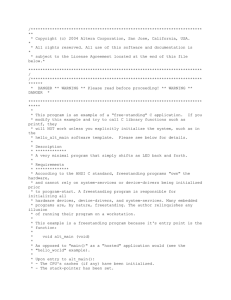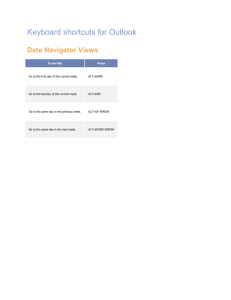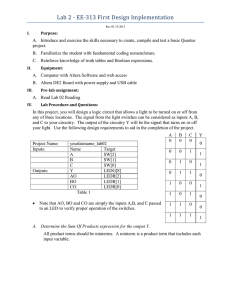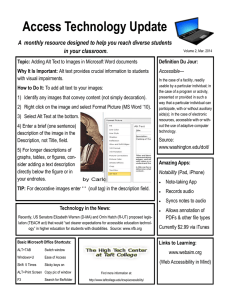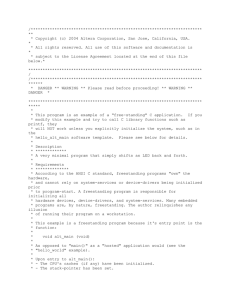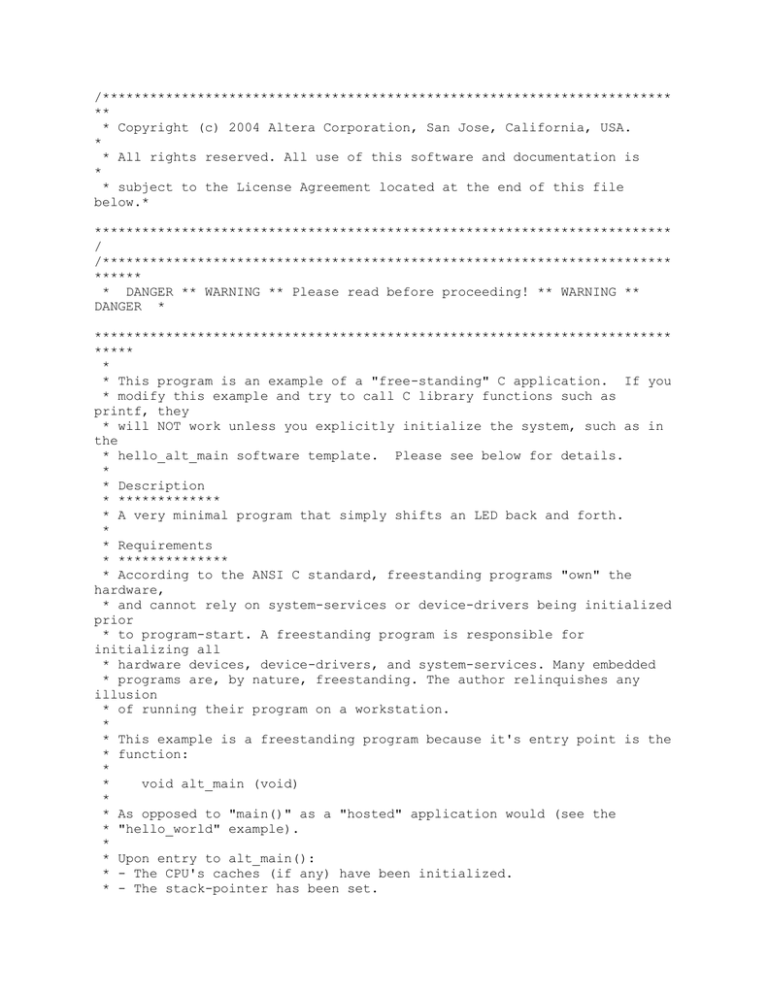
/************************************************************************
**
* Copyright (c) 2004 Altera Corporation, San Jose, California, USA.
*
* All rights reserved. All use of this software and documentation is
*
* subject to the License Agreement located at the end of this file
below.*
*************************************************************************
/
/************************************************************************
******
* DANGER ** WARNING ** Please read before proceeding! ** WARNING **
DANGER *
*************************************************************************
*****
*
* This program is an example of a "free-standing" C application. If you
* modify this example and try to call C library functions such as
printf, they
* will NOT work unless you explicitly initialize the system, such as in
the
* hello_alt_main software template. Please see below for details.
*
* Description
* *************
* A very minimal program that simply shifts an LED back and forth.
*
* Requirements
* **************
* According to the ANSI C standard, freestanding programs "own" the
hardware,
* and cannot rely on system-services or device-drivers being initialized
prior
* to program-start. A freestanding program is responsible for
initializing all
* hardware devices, device-drivers, and system-services. Many embedded
* programs are, by nature, freestanding. The author relinquishes any
illusion
* of running their program on a workstation.
*
* This example is a freestanding program because it's entry point is the
* function:
*
*
void alt_main (void)
*
* As opposed to "main()" as a "hosted" application would (see the
* "hello_world" example).
*
* Upon entry to alt_main():
* - The CPU's caches (if any) have been initialized.
* - The stack-pointer has been set.
* - That's all. The rest is up to you.
*
* If you modify this example and try to call C library functions such as
* printf, they will NOT work unless you explicitly initialize the
system.
* If you wish to use C library calls, it is strongly suggested you start
* with the hosted hello_world template which uses main() as it's entry
* point.
*
* On the other hand, if you want to write a program that gets-in even
* earlier, you will need to provide your own assembly-language machinesetup
* code by defining the symbol "_start". Any definition of _start in your
* directory will override the library definition. You can find source
code
* for the Nios II library _start here:
*
*
<NiosII-Kit-Install-Dir>/components/altera_nios2/HAL/src/crt0.S
*
* This software example requires a system with a PIO peripheral named
* "led_pio". The software example will run on the following hardware
* examples:
*
* Nios Development Board, Stratix II Edition:
* - Standard
* - Small
* - Full Featured
*
* DSP Development Board, Stratix II Edition:
* - Standard
* - Small
* - Full Featured
*
* Nios Development Board, Stratix Edition:
* - Standard
* - Small
* - Full Featured
*
* Nios Development Board, Stratix Professional Edition:
* - Standard
* - Small
* - Full Featured
*
* Nios Development Board, Cyclone Edition:
* - Standard
* - Small
* - Low Cost
* - Full Featured
*
* Peripherals Exercised by SW
* *****************************
* The hello_led.c program simply shifts an 8-bit variable back and
forth,
* writing the variable's value to the system's LED PIO peripheral on
every
* iteration.
*
* Software Files
* ****************
* hello_led.c - Main C file that contains the simple led manipulation
routine.
*
*/
#include "system.h"
#include "altera_avalon_pio_regs.h"
#include "alt_types.h"
/*
* This is a freestanding application, so we want to use alt_main
* as the entry point. However, if the debugger is run on this
* application, it will try to set a breakpoint at main, which
* the application does not contain. The below line creates an
* alias so the debugger is able to set a breakpoint at main,
* yet the application retains alt_main as it's entry point.
*/
int main (void) __attribute__ ((weak, alias ("alt_main")));
/*
* Use alt_main as entry point for this free-standing application
*/
int alt_main (void)
{
alt_u16 ledr = 0x0;
alt_u16 ledg = 0x2;
alt_u8 dir = 0;
alt_u8 flag = 1;
volatile int i;
/*
* Infinitely shift a variable with one bit set back and forth, and
write
* it to the LED PIO. Software loop provides delay element.
*/
while (1)
{
if ((ledr & 0x200)||(ledg & 0x01))
{
dir = (dir ^ 0x1);
}
if (dir)
{
if(flag)
{
ledg = ledg >> 1;
}
else
{
ledr = ledr >> 1;
IOWR_ALTERA_AVALON_PIO_DATA(LED_RED_BASE, ledr);
if(ledr & 0x01)
{
i = 0;
while (i<200000)
i++;
flag = (flag ^ 0x1);
ledr=0x0;
ledg = 0x80;
}
}
}
else
{
if(flag)
{
ledg = ledg << 1;
if(ledg & 0x100)
{
flag = (flag ^ 0x1);
ledg = 0x0;
ledr=0x1;
}
}
else
{
ledr = ledr << 1;
}
}
IOWR_ALTERA_AVALON_PIO_DATA(LED_RED_BASE, ledr);
IOWR_ALTERA_AVALON_PIO_DATA(LED_GREEN_BASE, ledg);
/*
* The delay element in this design has been written as a while loop
* to avoid confusing the software debugger. A tight, one line
software
* delay loop such as:
*
for(i=0; i<200000; i++);
* can cause problems when it is stepped through using a software
debugger.
* The while loop below produces the same behavior as the for loop
shown
* above, but without causing potential debugger problems.
*/
i = 0;
while (i<200000)
i++;
}
return 0;
}
/************************************************************************
******
*
*
* License Agreement
*
*
*
* Copyright (c) 2004 Altera Corporation, San Jose, California, USA.
*
* All rights reserved.
*
*
*
* Permission is hereby granted, free of charge, to any person obtaining a
*
* copy of this software and associated documentation files (the
"Software"), *
* to deal in the Software without restriction, including without
limitation
*
* the rights to use, copy, modify, merge, publish, distribute,
sublicense,
*
* and/or sell copies of the Software, and to permit persons to whom the
*
* Software is furnished to do so, subject to the following conditions:
*
*
*
* The above copyright notice and this permission notice shall be included
in *
* all copies or substantial portions of the Software.
*
*
*
* THE SOFTWARE IS PROVIDED "AS IS", WITHOUT WARRANTY OF ANY KIND, EXPRESS
OR *
* IMPLIED, INCLUDING BUT NOT LIMITED TO THE WARRANTIES OF
MERCHANTABILITY,
*
* FITNESS FOR A PARTICULAR PURPOSE AND NONINFRINGEMENT. IN NO EVENT SHALL
THE *
* AUTHORS OR COPYRIGHT HOLDERS BE LIABLE FOR ANY CLAIM, DAMAGES OR OTHER
*
* LIABILITY, WHETHER IN AN ACTION OF CONTRACT, TORT OR OTHERWISE, ARISING
*
* FROM, OUT OF OR IN CONNECTION WITH THE SOFTWARE OR THE USE OR OTHER
*
* DEALINGS IN THE SOFTWARE.
*
*
*
* This agreement shall be governed in all respects by the laws of the
State
*
* of California and by the laws of the United States of America.
*
* Altera does not recommend, suggest or require that this reference
design
*
* file be used in conjunction or combination with any other product.
*
*************************************************************************
*****/

